This Ramzan, ditch Mohammed Ali Road for off-the-menu eats at the city’s Kerala restaurants
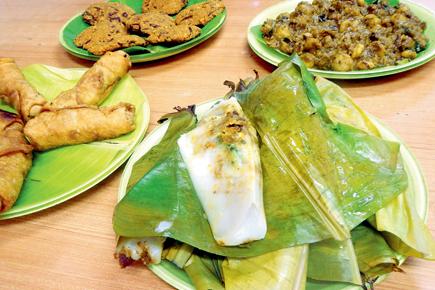
Fish Masala
A portly middle-aged man thunders, even as he gasps for breath while climbing up to the first floor of Fort’s Hotel Deluxe, “Where is my meen ada?” And, before the 22-year-old restaurant’s 58-year-old co-owner manages a reply, he hollers, “I ordered 20 pieces.” As Abdul Naseer assures him that his parcel is on the way, restaurant manager CH Basheer assures us that there’s no fear of a brawl. The man, says Basheer, is an old friend. Yet, they’d rather not delay the parcel. After all, where the meen ada is concerned, passions tend to run high.
ADVERTISEMENT
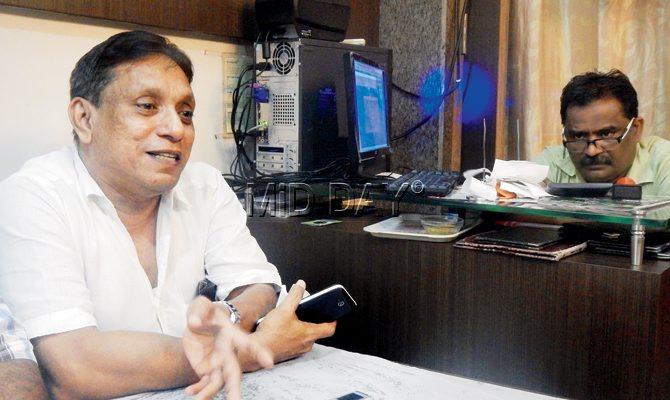
Deluxe’s co-owner Abdul Naseer and the restaurant manager CH Basheer remember the simple iftars back home in Kerala
The meen ada — fish masala coated with rice batter wrapped in banana leaf and steamed in a cooker — is among many dishes that have, over centuries, become peculiar to Kerala’s iftar menu. Luckily, they now find place in the city’s kitchens serving food from God’s Own Country.
Did any one say Mohammed Ali Road?
Peppered with Arab influence
By the fourth century, Arab trade marked by the lust for spice, on the Malabar coast was flourishing. Ammini Ramachandran, a culinary educator who has taught at New York’s Institute of Culinary Education, writes in Zester Daily (an online food magazine) that Arab traders would leave their shores in July, heading to Kerala, “the heart of the pepper country”. While some returned with the cargo, many would stay on, overwhelmed by the monsoons, settling down and marrying local women. This is how Islam was introduced to the state, and Arab influences crept into local cuisine.
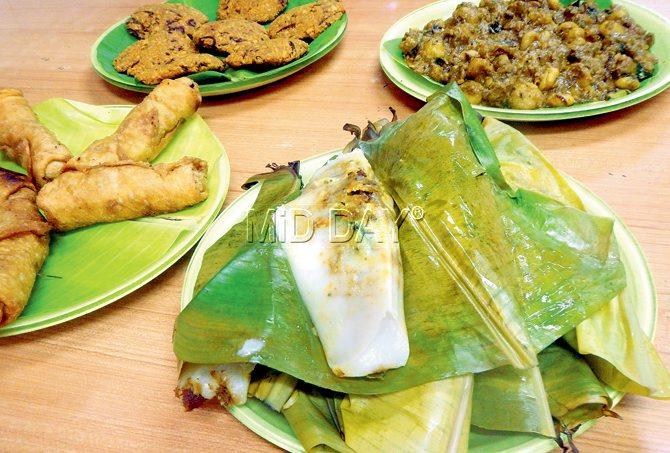
The meen ada, a snack made with ground rice and fish masala, is steamed in an idli steamer
Investment banker Aneez Adam, who spent four years studying the history of Kerala’s food to prep for his Ramzan special pop-up store in Calicut, explains that along with foreign traders came the knowledge of new food, like dried fruits, and cooking methods. “During their stay here, the Arabs hired locals as cooks, who soon became experts in the cuisine. The culture spread slowly,” says Adam.
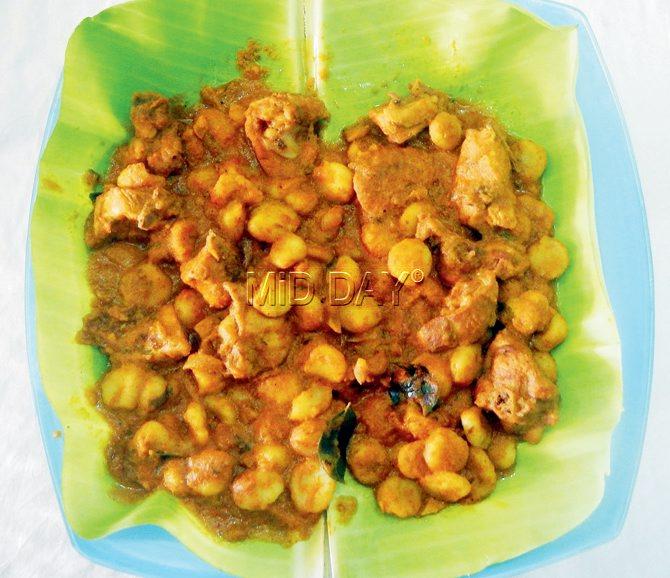
The kunji pathiri is made with steamed miniature pathiris made out of crushed rice and boiled meat
For instance, Alissa, a popular delicacy, comes from Yemen. “It is a semi-liquid, meat and wheat-based dish. The dish was a revelation to a crowd that was used to having wheat only as a kanchi,” he adds. Another example, he continues, is the kheema. “We have adapted the kheema to suit our tastes by adding coriander powder. Today, our iftar snacks such as erachi pathiri and kozhi pathiri are stuffed with kheema,” he adds. Even the small, triangular Kerala samosa is similar to the one consumed by Arabs, he adds. “The main difference is that we have made them spicier,” he says.
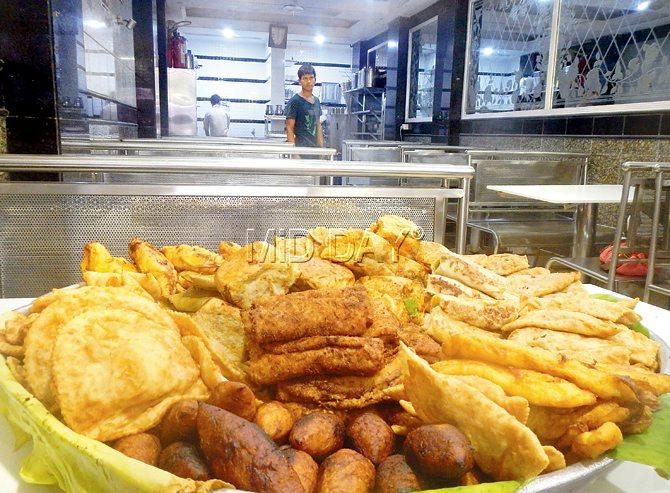
The spread at Bombay Restaurant for iftar includes mutta pathiri, chicken ada, prawns ada, unnakkaya and vegetable samosa. Pics/Suresh KK
When Portuguese explorers arrived in Calicut (now Kozhikode) in 1498, piloted by Vasco da Gama, they tweaked the local palette further. “The Portuguese East India Company had trade relations here and they introduced a special breed of banana called the nendra pazham, which is used to make the unnakkaya,” explains Abida Rasheed, a Malabar cuisine expert who works with the Taj chain of hotels as freelance food consultant.
An insider’s treat
In the steamy, nearly 200 sq feet kitchen at Deluxe, head chef Jayaprakash Valabhan, clad in a saffron lungi, is busy preparing one of Kerala’s most popular iftar snacks — kunji pathiri. With a flourish, he scoops up chopped tomatoes from a bucket placed near his station. He adds these to a cooking pot that’s already lined with onions, green chillies and a generous dollop of ginger and garlic paste. He sprinkles curry leaves, salt, spices and pepper. When he’s happy with the mix, he adds boiled mutton and steamed miniature pathiris — breads made with rice. In another corner of the kitchen, a steamer whistles (the one with meen adas) for attention. The waiters pop in, shouting parcel orders and cracking jokes to save the staff from the pressure cooker moment.
Between Deluxe, Rehmaniya, Taste of Kerala and Bombay Restaurant, all in Fort, there are six kinds of Kerala iftar snacks to choose from, not including the meat variants. However, you won’t find them on the menu. It’s only a select few who know they can ask for it during Ramzan.
Valabhan, who has headed the restaurant for 14 years, starts cooking at 12 noon, aiming to finish by 5 pm. They look at an order of between 100 to 150 pieces of snacks every day. “We make small quantities as they require elaborate cooking. The pathiris have to be rolled into small, flat shapes and steamed,” explains CH Basheer.
Culture on a platter
Kerala’s Muslims, says Sneha Nair, founder of the pop-up Poppaddum, break their fast with eethappazham pori or date fritters. “There is also thari kachiyathu, which is roasted semolina cooked in milk and the karri kanni, a porridge made with milk, water and dry fruits.” Main course includes erachi and pathiri, ishtew, puttu, mutton curry, ghee rice or biriyani. For suhur, or the pre-fast meal before dawn, most opt for light meals such as kanchi (rice soup). “Variations include wheat or badam kanchi to prevent gastric issues. Some have dried fruit-based drinks,” adds Rasheeda.
Moidu, the 65-year-old owner of Bombay Restaurant located close to Ragunath Dadaji Street, still recalls the first iftar that his restaurant hosted. “It was in 1981, the same year that we opened the restaurant. People came from all across the city for a Malayali iftar and we didn’t expect a large crowd. People waited in long queues outside the restaurant. But we somehow managed the show,” he laughs.
It’s 7.19 pm. Outside, a small crowd has gathered, eager to dig in. As the bell rings, announcing the end of the fast, we chat with Abu Bakr, a Pune resident, who is here after friends suggested he drop in. “I had come to Mumbai for a dental appointment and when I realised I would be on the road during iftar, I decided to come here,” he says, biting into an unnakkaya.
 Subscribe today by clicking the link and stay updated with the latest news!" Click here!
Subscribe today by clicking the link and stay updated with the latest news!" Click here!






